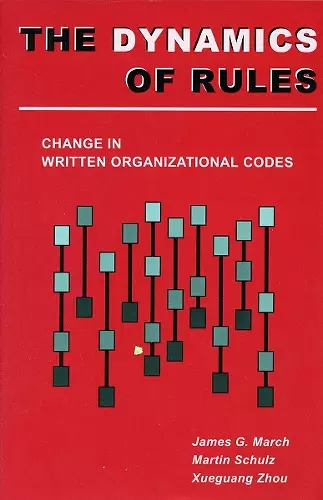The Dynamics of Rules
Change in Written Organizational Codes
Martin Schulz author James G March author Zhou Xueguang author
Format:Hardback
Publisher:Stanford University Press
Currently unavailable, and unfortunately no date known when it will be back
This hardback is available in another edition too:
- Paperback£32.00(9780804739962)

Written rules in formal organizations are distinctive elements of organizational history; they shape organizational change and are in turn shaped by it. These rules are created, revised, and eliminated in ways that leave historical traces, and they have a visibility and durability that elude non-written rules. They thus provide rich data for an empirical probe into the dynamics of organizational history.
This study uses qualitative and quantitative data from the history of a specific organization, Stanford University, to develop speculations about the ways in which written rules change. It contributes both to a theory of rules and to theories of organizational decision-making, change, and learning. Organizations respond to problems and react to internal or external pressures by focusing attention on existing and potential rules. The creation, modification, or elimination of a rule, then, is a response to events in the outside environment (such as new government regulations) or to events within the organization (such as alterations in internal government structures).
The authors elaborate a simple set of ideas about written rules and their dynamics, emphasizing the interplay among periodic major shocks to the system from outside, experiences with individual rules as they age and are revised, and the spread of effects through an interconnected set of rules. It is a story in which changes introduced in one part of a rule system create adjustments in other parts, including the same rule later in time, as the consequences of the changes are experienced and as rule-making attention is mobilized, satiated, and redirected. These processes involve the full panoply of political negotiation, symbolic competition, discussion, and problem solving that are typical of organizational decision making.
"In developing an elegant and sophisticated theory of how and why organizational rules change, the authors have created an entirely new field of organizational research. I know of no other general theory on the rise, evolution, and demise of rules, and I have never seen such a rich longitudinal dataset on rules." —Frank Dobbin, Princeton University
"This is an important book. . . . It outlines an emerging theory of the dynamics of organizational rules that enriches many other perspectives on the functioning of organizations. . . . Future discussions of institutionalization, organization-environment adaptation, organizational learning, organizational change, and the effect of contextual influences on individual behavior will benefit from consideraiton and inclusion of the themes presented here."—Personnel Psychology
"James March, Martin Schulz, and Xueguang Zhou address the fascinating question of how rules evolve in a complex organization with a unique data set. . . . No other book equals this one in regard to the breadth of the questions asked and the mode of analysis. . . . Scholars interested in the study of institutional arrangements will find this a valuable part of their library."—American Political Science Review
ISBN: 9780804737449
Dimensions: unknown
Weight: 540g
248 pages